Live on the homepage now!
Reader Supported News
False equivalence and what-aboutism—has no one learned anything from the last decade?
We're all going to have to come to grips with the fact that CNN is going to go all-in on this obvious snipe hunt over the classified documents that lawyers for the president gave back to the National Archives as soon as they found them. According to NBC, there was a second batch of documents. Two! two! two snipes in one!
This so energized the various gun-bearers and bloodhounds at CNN that one of them, Stephen Collison, went storming off into the bogs on his own. This shebeen doesn't often call out individual reporters by name; the job is hard enough without an ever-expanding peanut gallery. And Collison's egregious effort Thursday morning was only the latest indication that CNN, under its new management, thinks the what-aboutism of the Biden documents is going to be its train to glory. But this lede right here? This is everything that's been wrong about elite political journalism ever since everyone went down to Arkansas in the early 1990s to troll for fish stories.
President Joe Biden’s embarrassment over classified documents found in his former offices is spiraling into a major political crisis that threatens to undermine the case for Donald Trump to be charged for his own hoarding of secret material. The revelation that another set of secret documents dating from Biden’s time as vice president were found at a second location immediately fueled Republican claims that the ex-president is being treated unfairly as he is investigated by a special counsel over classified information found at Mar-a-Lago. While Trump’s retention of hundreds of documents and attempts to thwart their transfer to the National Archives as required by law appears more serious at this stage, Biden’s deepening troubles are offering a huge opening to the new pro-Trump House majority. The GOP is already moving to unleash an investigative machine designed to prove their long-held belief that Democrats have weaponized the federal government and intelligence agencies against conservatives – and to create the appearance of equivalence between Trump’s behavior as president and the actions of Biden and his circle.
Do you see how this works? The only way that the current situation spirals "into a major political crisis" and/or offers "a huge opening to the new pro-Trump House majority" is if the elite political media plays along. The GOP is "already moving to unleash an investigative machine" to prove that Dr. Anthony Fauci conspired with Chinese Communists to create COVID-19. This is no more a valid use of the Congress' investigative power than what's coming on the Biden documents. The only validation the two investigations can receive is if they are treated as serious news stories and not as the transparent ratfcking they obviously are. Moreover, almost every news operation that has joined in the snipe hunt also makes a point to remind us that the Biden situation has absolutely nothing in common with the Pool Shed Papers.
Except, of course, for what the Republicans dishonestly claim that it does. Again, from Collison:
Biden’s own sharp criticisms of Trump’s handling of secret intelligence are now coming back to haunt him and opening him up to charges of hypocrisy. While each case will be assessed according to its own legal merits, the possibility that Trump would face criminal action for conduct that will – for many voters – appear to broadly mirror Biden might make any prosecution politically unsustainable. It would also play into Trump’s claims he is being targeted in order to derail his 2024 White House bid that started with a lackluster launch but could now be energized by the showdown over secret documents.
This is not news writing. As analysis, it fails of its own internal contradictions. The two situations are radically different, until the Republicans say they're not. Political sustainability ought not to be a measure of whether a crime is prosecuted. If it does, political utility thereupon has trumped empirical reality. And there is going to be a lot more of this, if the current episode is any indication.
With a flash of its orange tail and a winnowing woowoowoowoooo, the snipe heads into the bog, and everyone follows merrily along.
READ MORE 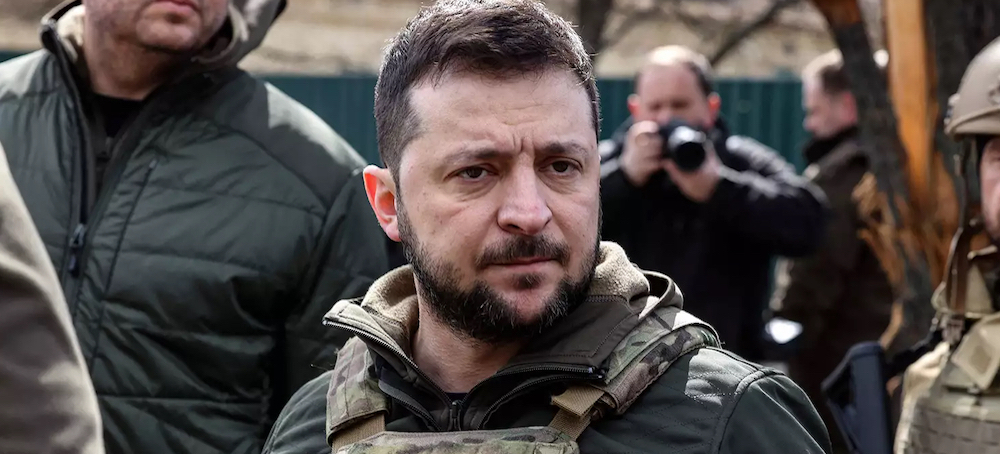 Ukainian president Volodymyr Zelensky. (photo: Ronaldo Schemidt/Getty Images)
Ukainian president Volodymyr Zelensky. (photo: Ronaldo Schemidt/Getty Images)
Head of the Wagner mercenary group, Yevgeny Prigozhin, had accused Russia’s military establishment of trying to ‘steal victory’ in Soledar.
In a late-night video address on Friday, Zelenskyy said the battles for Soledar and other eastern towns and cities in Ukraine were continuing despite competing claims by Wagner and the Russian government that it was their forces who had taken control of the salt-mining town.
The fall of Soledar would mark Russia’s first significant battlefield gain after months of military retreats and setbacks against Ukrainian forces, though military analysts and the United States have downplayed the strategic significance of the town, which has seen some of the bloodiest fighting in the war so far.
“The tough battle for the Donetsk region continues. The battle for Bakhmut and Soledar, for Kreminna, for other towns and villages in the east of our country continues,” Zelenskyy said in his address.
“Although the enemy has concentrated its greatest forces in this direction, our troops – the Armed Forces of Ukraine, all defence and security forces – are defending the state,” he said.
Zelenskyy then addressed the tussle between the Russian defence ministry and Wagner mercenaries.
“They are already fighting among themselves over who should be credited with some tactical advance,” he said.
“It’s a clear signal of failure for the enemy. And it’s another incentive for all of us to put more pressure on the occupier and to inflict heavier losses on the enemy.”
Russia’s defence ministry said its forces had captured Soledar on Thursday evening, allowing them potentially to cut off Ukrainian supply routes to the city of Bakhmut, southwest of Soledar, and trap remaining Ukrainian forces there.
In its statement, the ministry credited the town’s seizure to Russian troops and aviation without mentioning the role of the Wagner group.
Wagner founder Yevgeny Prigozhin, who has harshly criticised the failings of the regular Russian army, had issued a premature claim earlier this week that Soledar had fallen. He also maintained the fighting there was exclusively being waged by his men.
In comments apparently aimed at Russia’s defence establishment, Prigozhin complained on Friday about “infighting, corruption, bureaucracy and officials who want to stay in their positions”, as well as what he called constant attempts to “steal victory” from Wagner.
In response, Russia’s defence ministry late on Friday issued a second statement seeking “to clarify” the situation and acknowledging the role of Wagner Group fighters in Soledar.
“As for the direct storming of Soledar’s city quarters occupied by the armed forces of Ukraine, this combat task was successfully accomplished by the courageous and selfless actions of volunteers from the Wagner assault detachments,” the defence ministry said.
The Kyiv Independent news outlet noted that the competition for credit between the Russian forces had not gone unnoticed in Ukraine, with Mykhailo Podoliak, an adviser to the president’s office, saying on Twitter that the “public rumble” over “who is fighting better” in Soledar was “a good sign of the beginning of the stunning end”.
Russia has allowed Prigozhin to recruit tens of thousands of its prisoners for Wagner, which US officials say is a 50,000-strong force, and let him equip them with tanks, aircraft and missile defence systems.
According to Reuters, the Kremlin has also stood by while the Wagner boss has flung sometimes profane criticism at Russia’s top brass, although some Western military analysts suggested the recent appointment of the most senior Russian general to lead the war in Ukraine was designed to balance Prigozhin’s influence.
Despite its sometimes publicly strained ties with the Russian defence ministry, some Western military analysts suspect Wagner is closely affiliated with it.
One source close to the Russian authorities, who declined to be named because they were not authorised to speak to the media, told Reuters the Kremlin viewed Prigozhin as a useful operator but maintained unspecified safeguards in terms of his growing power.
“There is a ceiling (of growth) and mechanisms in place,” said the source, who declined to provide more details.
READ MORE 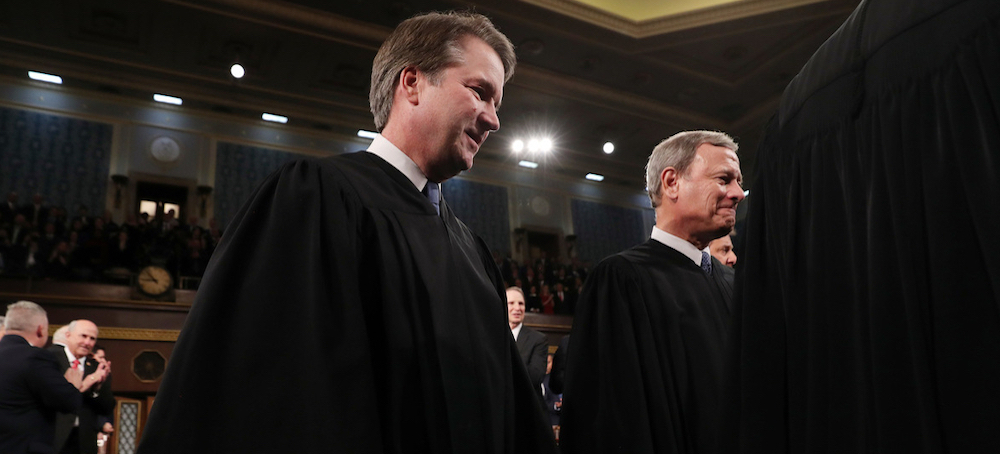 Justice Brett Kavanaugh and Chief Justice John Roberts. (photo: Getty Images)
Justice Brett Kavanaugh and Chief Justice John Roberts. (photo: Getty Images)
C.M. Lewis interviews labor researcher Kate Bronfenbrenner about a case that could have widespread implications for unions across the country.
“The ability to withhold your labor is the one powerful tool throughout the history of unionization that has ensured workers can improve their working conditions,” Teamsters General President Sean M. O’Brien offered in a statement issued the same day. “This right is now on trial at the Supreme Court,” O’Brien said, calling on the court to affirm the rulings of lower courts. Noel J. Francisco, the Jones Day attorney representing Glacier Northwest, did not respond to a request for comment.
C.M. Lewis, working for In These Times, interviewed Kate Bronfenbrenner, director of labor education research and a senior lecturer at Cornell University’s School of Industrial and Labor Relations about the potential labor implications of the case. The interview has been edited for clarity and length.
C.M. Lewis: The Supreme Court just heard oral arguments in Glacier Northwest Inc. v. International Brotherhood of Teamsters. What question does the case put to the court?
Kate Bronfenbrenner: There’s two questions. The employer sued the union for tortious destruction of company property and is going after the Teamsters, and basically going after the government, arguing under the takings clause that it has to be reimbursed for the property.
The basic case is that when workers go on strike, by definition, the purpose of the strike is to cost the employer something economically. Our labor law balances employer rights and union rights; employers can lock workers out, and unions can go on strike. When employers lock workers out, it hurts workers, and when unions go on strike, the idea is that it would hurt employers. If workers strike at any employer, if they don’t do their work, most employers are going to lose some money.
Glacier Northwest’s argument is that cement workers going on strike caused some cement to harden when they walked off the job. Even though workers left the trucks running in order to try to protect the cement, the company didn’t get to the trucks to take care of it in time, and so the cement hardened. The company suffered losses, and because of those losses, the company is suing the union for tortious destruction of property.
The National Labor Relations Board ruled that it was the company that committed an unfair labor practice by retaliating against the union for going on strike. That has to go before the full board, but it has been declared a legal strike by the NLRB. And historically, the federal government does not interfere in NLRB cases, and the courts do not interfere in NLRB cases.
Lewis: It seems like an important question is whether employers can go to the courts if they get an answer they don’t like from the NLRB.
Bronfenbrenner: The NLRB is empowered under the preemption doctrine with determining whether union conduct is protected by federal labor law like the National Labor Relations Act, and they also decide whether said labor law preempts the application of other law. In this case, the company is trying to go around that.
Now, of course companies can go to the courts, but whether they win in the courts is an entirely different question. We can see Amazon and Starbucks challenging every single decision made by the NLRB, challenging the legitimacy of the NLRB, but if we start to have a very active right-wing judiciary that starts to turn over precedent in NLRB decisions and court cases supporting NLRB decisions, we will be in very dangerous terrain. There’s a great risk that this will happen in this case, and if it does, union workers will have a very limited right to strike.
Lewis: What do you see as the broader impact for employer behavior if the Supreme Court sides with the company in this case?
Bronfenbrenner: These cases get to the Supreme Court because the federal courts in general have moved to the right. And so we get lower level federal court decisions, but then the Supreme Court gets to rule on them, which is the case in Glacier Northwest.
The court has recognized only one exception to the preemption doctrine, allowing employers to go to state courts — and that is, and it’s kind of strange, only for extreme cases that are “so deeply rooted in local feeling and responsibility that in the absence of compelling congressional direction, we could not infer that Congress deprived the states of the power to act.” Up until now the court has defined “extreme cases” as things like picket line violence, intimidation and coercion, but that did not exist in this case. The court has never applied that, if a strike costs the employer money, then the strike is not protected, which is what the Glacier Northwest is arguing.
And if that became the law, you could see that if airline employees went on strike that costs the airline money. Or imagine the UPS strike, if the UPS strike moves forward and it costs UPS money because packages aren’t delivered. Some of the packages contain goods that cannot survive in the heat or the cold and are damaged. UPS could hold the Teamsters liable for that. Unions, because of the costs of these lawsuits and the possible liabilities, would then be afraid to go on strike and the right to strike would be severely limited.
Lewis: It seems likely that labor could face tough rulings from the courts. What does a hostile judiciary mean for labor strategy moving forward?
Bronfenbrenner: Labor could go any number of directions in how they respond. It could have the effect that labor gets very cautious. Unions could start to decide that this is a time they shouldn’t have major actions and strikes, and they should back off filing massive unfair labor practice cases, and instead — very much like the early years after Reagan came to office — unions kind of back off and become afraid of the strike.
On the other side would be unions saying, you know, we know that this is political, and if we, in response to their decisions, create more chaos in the economy, strike more, engage in community campaigns and get the public rallied about this, then the judiciary may start to feel the pressure, or the executive branch will put pressure on the judiciary.
We are at this moment where the Teamsters are planning a national UPS strike. Will an adverse decision in the Glacier Northwest case start to undermine that campaign? That would have huge repercussions for the labor movement globally, because a successful UPS strike will impact the global labor movement — as it did in 1997, it will do so again.
Add in that the court is doing this at a time when public support for unions is at the highest it’s been in, you know, [about six decades]. This is not an ideal time to start gutting worker rights.
Lewis: Is there an opportunity for labor to politically frame this question, in a way that labor often has struggled to do?
Bronfenbrenner: I think what is more important than trying to use it politically is to use it to organize and increase your power. Labor doesn’t have enough power right now. In a recent issue of In These Times, Hamilton Nolan pointed out that, in resources and amount of money, labor spends more on politics relative to other things. That’s putting the cart before the horse. Labor doesn’t have the power to make change politically, and will only have that power if it organizes more and builds out community and global alliances. When it builds that power, the political power will fall into place.
Lewis: Anything else that you think is important to mention?
Bronfenbrenner: The attack on the public sector by the courts and legislatures is very significant. This was a strategic plan by some of the biggest corporations in the country, recognizing the union’s political power depends on having money and resources, and that public sector unions are very active politically. While they failed in Ohio and Pennsylvania, they succeeded in Wisconsin and Indiana. These were states with strong labor movements, and that’s gone.
Companies like the Koch Brothers and Koch Enterprises are being very strategic. And it’s not new. We saw Coors Beer doing that in the 1980s. But the fact is, it is a much more effective and much more national strategy.
I’m sure there are meetings where these guys all get together — and they are mostly guys — and say, “OK, what state are we gonna target next? Where are we going to file a court case?”
READ MORE 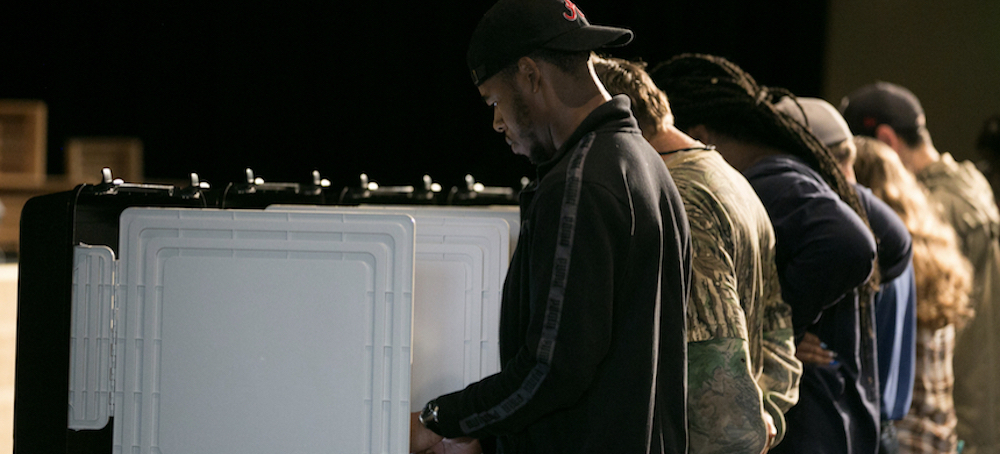 Voters at a polling precinct. (photo: Jessica McGowan/Getty Images)
Voters at a polling precinct. (photo: Jessica McGowan/Getty Images)
Tax filings reveal advocacy arm of Heritage Foundation spent $5m on lobbying in 2021 to block voting rights in battleground states
Previously unreported 2021 tax filings from Heritage Action for America, which operates as the foundation’s activist wing, shows that it spent $5.1m on contracting outside lobbying services. The outlay comes on top of $560,000 the group invested in its own in-house federal lobbying efforts that year, as well as registered lobbying by Heritage Action staffers in at least 24 states.
The 990 tax filing was obtained by the watchdog group Documented and shared with the Guardian. It points to the pivotal role that Heritage Action is increasingly playing in shaping the rules that govern US democracy.
The efforts help explain the unprecedented tidal wave of restrictive voting laws that spread across Republican-controlled states in the wake of the 2020 presidential election. The Brennan Center reported that more voter suppression laws were passed in 2021 than in any year since it began monitoring voting legislation more than a decade ago.
The expenditures also signal a dramatic increase in Heritage Action’s advocacy activities. In 2020, Heritage Action had reported no spending at all on outside lobbying.
Heritage Action, whose board includes the Republican mega-donor Rebekah Mercer, is set up as a 501(c)4 under the US tax code which exempts it from paying federal taxes. It operates as a “dark money” group, avoiding disclosing the sources of its total annual revenue of over $18m.
In the past two years the organization through its public messaging has echoed Donald Trump’s lie that US elections are marked by rampant fraud. A private plan prepared by Heritage Action last year set out a two-year, $24m “election integrity” strategy.
The plan, obtained by Documented, proposed a two-pronged approach that would work to block moves by Democrats in Congress to bolster voting rights while at the same time pressing Republican-controlled states to impose restrictions on access to the ballot box. It said: “Where Democrats hold power, we must defend against bad policy. Where conservatives and our allies are in power, we must advance changes that protect the lawful votes of Americans.”
The Heritage Action plan, which was first reported by the New York Times, is being published by the Guardian for the first time.
Part of Heritage Action’s two-year strategy is to promote what it calls “model election laws”, focusing initially on eight battleground states: Arizona, Florida, Georgia, Iowa, Michigan, Nevada, Texas and Wisconsin. In a private meeting with donors in Tucson, Arizona, in 2021, the group’s executive director, Jessica Anderson, boasted about the role Heritage Action had played in pressing Republican-controlled legislatures to impose strict restrictions on voting, including limits on mail-in voting and early voting days.
In a video of that meeting obtained by Documented, Anderson told the donors that the group acted “quickly and quietly”, bragging that “honestly nobody noticed” their behind-the-scenes influence. Heritage Action staff have registered to lobby in at least two dozen states.
The laser-like focus on key swing states like Georgia appears to have had an impact. The New York Times found that one-third of the 68 voting bills filed in Georgia in 2021 contained policy measures and language that aligned closely with proposals from Heritage Action.
The group has publicly claimed that it had a hand in advancing 11 voting bills in at least eight states in 2021, though in some cases legislation was passed in only one chamber or went on to be vetoed by the state’s governor.
Heritage Foundation, under the auspices of its elections supremo Hans von Spakovsky, curates an “election fraud database”. It claims to expose the errors, omissions and mistakes made by election officials, but it presents incomplete and misleading information and underscores how exceptionally rare fraud is within the US system.
Its records stretch back 40 years, a period in which billions of votes have been cast. Yet the database records only 1,402 “proven instances of voter fraud” – a “molecular fraction” of votes cast nationwide, according to the Brennan Center for Justice.
The newly disclosed tax filings also show that Heritage Action ramped up its spending on advertising as it sought to influence lawmakers and the public around its controversial voting agenda. In 2021, the organization reported paying $6.1m to outside contractors for “marketing and advertising” – a sharp rise from $1.8m the previous year.
Among the top contractors employed by Heritage Action was CRC Advisors, the consulting firm tied to Leonard Leo, a chairman of the Federalist Society who is best known for his decades-long campaign to pack federal courts with rightwing judges. CRC Advisors was paid over $797,000 for “marketing and advertising” in 2021.
Some of that ad spending was targeted in Georgia. After that state’s 2021 restrictive voting law caused a backlash from businesses and led Major League Baseball to move the All-Star Game from Georgia to Colorado, Heritage Action spent nearly $1m on TV ads defending the law aired on CNBC and local TV stations.
The group also spent nearly $500,000 on Georgia TV and digital ads during the MLB All-Star Game, and spent at least $700,000 more on ads supporting the Georgia bill’s passage.
On the federal level, Heritage Action also ran ads in West Virginia, Arizona, Montana and New Hampshire urging the Democratic senators in those states to oppose reforming the filibuster to pass democracy reform legislation with a simple majority. “It’s an all-hands-on-deck moment,” Anderson said of potential filibuster changes at the April 2021 donor summit.
Heritage Action was formed in 2010 out of the rightwing policy empire embodied in the Heritage Foundation, which dates back to 1973. The foundation was created by Paul Weyrich, a richly networked conservative who wanted to inculcate small government, anti-regulation ideology at both federal and state level.
From the start, restricting access to voting was a core part of Weyrich’s mission. In 1980 he infamously articulated his thinking by saying: “I don’t want everybody to vote … Our leverage in the elections quite candidly goes up as the voting populace goes down.”
READ MORE 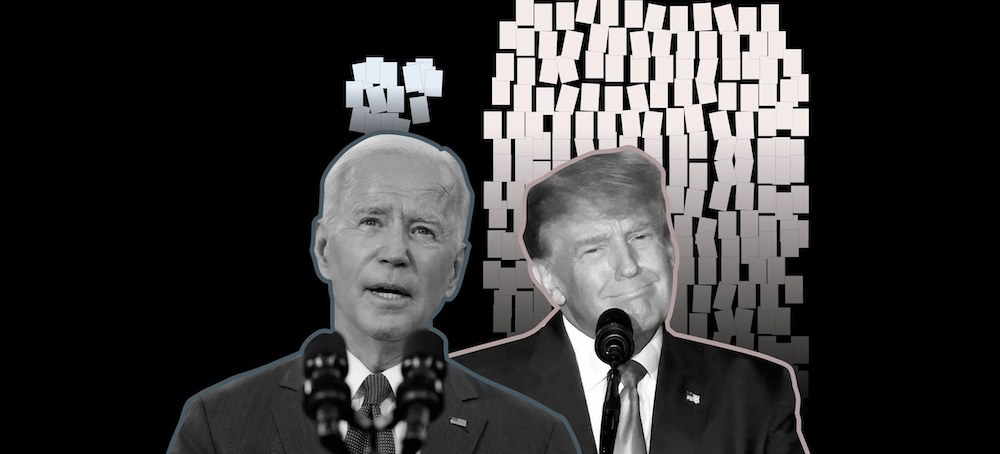 "Conservatives used to be outraged over the DOJ cracking down on errant sensitive material. They've now changed their tune ... for some reason." (image: USA TODAY)
"Conservatives used to be outraged over the DOJ cracking down on errant sensitive material. They've now changed their tune ... for some reason." (image: USA TODAY)
Conservatives used to be outraged over the DOJ cracking down on errant sensitive material. They've now changed their tune ... for some reason
The investigation into the hundreds of documents Trump hoarded at his Mar-a-Lago estate was characterized by the right as a political witch hunt aimed at preventing the former president from running for reelection. Now that Biden is involved, Republicans think the government should be cracking down with more vigor.
In August, Sen. Ted Cruz (R-Texas) called the Mar-a-Lago raid a horrific abuse of power and a “fishing expedition,” accusing Attorney General Merrick Garland of damaging the credibility of the FBI. Following the revelation that documents had been discovered in Biden’s office, however, Cruz immediately called for the convening of a grand jury, and insinuated that the Penn Center’s”s Chinese donors were a risk to the security of the documents.
Rep. Marjorie Taylor Greene (R-Ga.) called for the FBI to be defunded when details of the Mar-a-Lago raid emerged, but she’s been quick this week to accuse the Biden administration of concealing information, alleging the DOJ appointed a special counsel (something that was also done in the Trump investigation) in order to provide cover for Biden. Greene has also called for both Biden and Garland to be impeached over the documents.
House Republicans have already launched an investigation into the Justice Department as backlash for the Mar-a-Lago raid, ordering Garland and others to retain documents and communications pertaining to the investigation. Rep. Jim Jordan (R-Ohio), a leader in the charge to undermine the DOJ’s investigation of Trump, has now launched a congressional investigation to make sure the DOJ is cracking down on Biden to their satisfaction.
Fox News has been all over it, too, portraying Trump as a cooperative subject despite his and his team’s repeated attempts to stonewall and delay investigators progress. The network previously condemned rulings by a judge appointed to oversee the review of the recovered documents as “corrupt,” while entertaining Trump’s dubious claims that he had privately declassified the documents, calling the investigation an “election ploy” and a “shot between the eyes of the republic.”
Since the discovery of the documents in Biden’s office and home, the network’s approach toward investigations into sensitive material has conveniently flipped. Laura Ingraham, to much mockery from social media, claimed the DOJ was being too lenient on the Bidens, who she claimed were hiding the docs as part of a corruption cover up. Tucker Carlson, who called the Mar-a-Lago raid a “power grab,” invited former Bush Ethics Lawyer Richard Painter on to lambaste Biden for irresponsibly handling and retaining classified documents.
Friday morning on America’s Newsroom, radio host Clay Travis even claimed falsely that Trump was not given time to conduct his own search for documents, and that he gave investigators access to the Mar-a-Lago documents during their investigation — only to be gently corrected by host Dana Perino. “They did have a months-long back-and-forth,” Perino said.
Attorney General Merrick Garland on Thursday appointed Robert Hur to serve as a special counsel overseeing the investigation into the Biden document debacle. Roughly a dozen classified documents (an exact number has yet to be released, but it wasn’t 300) were recovered from three locations at Biden’s office and home, and according to both the DOJ and the White House, the president’s lawyers were forthcoming about the discovery and quickly turned over the material to investigators.
Trump responded to the discovery of classified documents in Biden’s possession in typical fashion, writing on Truth Social that the DOJ should immediately end the special counsel investigation into Trump because he “did everything right,” while instructing the DOJ to go after the “Biden crime family” instead.
Speaking of crime families, the Trump Organization was slapped with a $1.6 million criminal penalty on Friday after being convicted of criminal tax fraud in December.
READ MORE 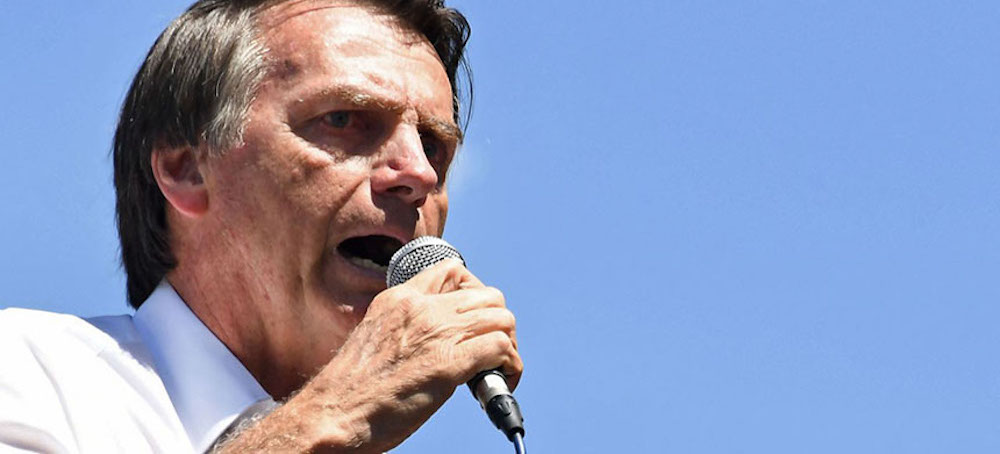 Jair Bolsonaro. (photo: Evaristo Sa/Getty Images)
Jair Bolsonaro. (photo: Evaristo Sa/Getty Images)
ALSO SEE: Top Brazil Court Greenlights Probe of Bolsonaro for Riot
Brazil’s Supreme Court has ordered the arrest of Bolsonaro’s Justice Minister Anderson Torres, who remains in Florida.
The Brazilian Supreme Court has ordered the arrest of Anderson Torres in relation to the riot in Brasilia on January 8, when thousands of Bolsonaro supporters stormed Congress, the Supreme Court and the presidential palace to overturn October’s election results.
Torres has denied any wrongdoing and said he would turn himself in to present his defence, but he and Bolsonaro remain in the US state of Florida.
The government of Brazilian President Luiz Inacio Lula da Silva, which has pledged to investigate those who helped finance and plan the attack on the country’s democratic institutions, said on Friday it had not yet presented a US extradition request for Torres.
Justice Minister Flavio Dino told reporters, however, that “if by next week [Torres’s] appearance hasn’t been confirmed, of course, we will use mechanisms of international legal cooperation. We will trigger procedures next week to carry out his extradition”.
Torres, who was sworn in as Brasilia’s security chief on January 2, was in the US on the day of the riot. But he was removed from his post following the attack as Supreme Court Justice Alexandre de Moraes, who is running the investigations into the riot, accused him of “neglect and collusion”.
The violence in Brasilia came just weeks after Lula, who previously served as Brazil’s president from 2003 to 2010, narrowly defeated Bolsonaro in an October election run-off, setting off angry protests and blockades by the former far-right leader’s supporters.
For months, Bolsonaro falsely claimed that Brazil’s electronic voting system was vulnerable to fraud, raising fears he planned to contest the results. The ex-president’s campaign also led to accusations this week that he helped spur the riot.
Bolsonaro, who left for the US two days before Lula was sworn in as president on January 1, has rejected that criticism. He tweeted on Sunday that a peaceful protest is part of democracy but vandalism and invasion of public buildings are “exceptions to the rule”.
Still, federal prosecutors on Friday asked the Supreme Court to include Bolsonaro on a list of people under investigation after he posted a video “questioning the regularity of the 2022 presidential elections”.
By doing so, “Bolsonaro would have publicly incited the commission of a crime”, the prosecutor general’s office said in a statement.
The video was posted two days after the riot and later deleted. But the office said that even though it came after the uprising, it may serve as “a probative connection” that justified “a global investigation of the acts performed before and after January 8, 2023 by the defendant”.
Dino, Brazil’s justice minister, told reporters earlier that no connection has yet been established between the capital riot and Bolsonaro.
Meanwhile, Brazil’s police raided Torres’s home earlier this week, discovering a draft of an order that would have taken control of Brazil’s electoral authority and potentially overturned the election.
The document’s origins remain unclear, and Dino said Torres would need to share information about where it originated.
By failing to initiate a probe against the document’s author or report its existence, Torres could be charged with dereliction of duty, Mario Sergio Lima, a political analyst at Medley Advisors, told The Associated Press news agency.
Torres said on Twitter that the document was probably found in a pile along with others intended for shredding and that it was leaked out of context to feed false narratives aimed at discrediting him.
The federal district’s former governor and former military police chief are also targets of the Supreme Court investigation made public on Friday. Both were removed from their positions after the riot.
READ MORE  Greta Thunberg. (photo: Getty Images)
Greta Thunberg. (photo: Getty Images)
Climate activists march in Luetzerath against a plan to tear down the village to build a coal mine extension.
Crowds of activists demonstrated on Saturday in the western hamlet of Luetzerath, waving banners and chanting as a bass band accompanied them.
Luetzerath, deserted for some time by its original inhabitants, is set to disappear to make way for an extension of the adjacent open-cast coal mine, one of the largest in Europe. It is operated by the energy firm RWE.
Environmentalists say bulldozing the village to expand the Garzweiler mine would result in huge amounts of greenhouse gas emissions. The government and RWE argue the coal is needed to ensure Germany’s energy security.
The Swedish climate activist Thunberg, 20, marched at the front of the procession as demonstrators converged on the village, showing support for activists occupying it in protest over the coal mine extension.
‘Fighting for climate justice’
Some fought with police who were trying to move the march away from Luetzerath, which is surrounded by fences.
“We’re in 2023 in the middle of a climate crisis, and while destroying a village to expand one of the biggest carbon bombs in Europe should be considered criminal, it is still legal,” said Sara Ayech, who leads the climate campaign at Greenpeace International.
“Fossil fuel companies’ influence is so powerful that the ones considered criminals now are the ones fighting for climate justice,” she said. “It is time to hold fossil fuel companies accountable.”
In an operation launched this week, hundreds of police have been working to remove activists from the hamlet.
But 20 to 40 climate activists were still holed up in the village late on Friday, a spokeswoman for the protest movement said.
Evacuation ongoing
Authorities said they were entering the final stages of evacuating the activists. In just a few days, a large part of the protesters’ camp has been cleared by police and its occupants removed.
German media, quoting the police, reported about 470 activists had been removed from the village since the beginning of the evacuation.
Large numbers of protesters, including Thunberg, assembled on Saturday close to the village, which has become a symbol of resistance against fossil fuels.
“Against the evacuation, for an end to coal and climate justice” is the rallying call for the demonstrations.
Police reinforcements came from across the country to participate in the clearing of the village.
Organisers are hoping that tens of thousands of demonstrators will attend while police said they expect about 8,000 people.
Many of the activists in the village have built structures high up in trees while others have climbed to the top of abandoned buildings and barns.
Activists said they have dug a tunnel under the hamlet to complicate the evacuation effort.
The movement has been supported by protests across Germany. On Friday, masked activists set fire to rubbish bins and painted slogans on the offices of the Greens in Berlin.
The party, part of Germany’s ruling coalition with Chancellor Olaf Scholz’s Social Democrats and the liberal Free Democrats, has come under heavy criticism from activists who accuse it of betrayal.
Following the energy crisis set off by the Russian invasion of Ukraine, the government has brought old coal power plants back online.
Officials also signed a compromise with RWE that made way for the demolition of Luetzerath but spared five nearby villages.
The energy firm also agreed to stop producing electricity with coal in western Germany by 2030, eight years earlier than previously planned.
Follow us on facebook and twitter!
PO Box 2043 / Citrus Heights, CA 95611



No comments:
Post a Comment
Note: Only a member of this blog may post a comment.